The Photography program prepares students for the wide range of methods of visual expression necessary in today’s photographic market.
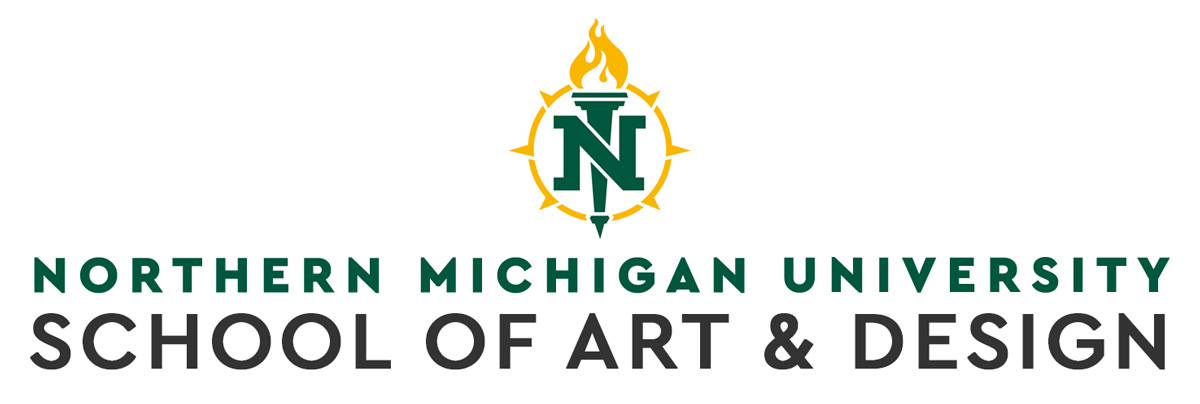

PHOTOGRAPHY



The Photography Major at NMU
Photography at Northern Michigan University The Photography Program at Northern Michigan University provides students with a strong foundation in technical expertise, creative exploration, and conceptual development, preparing them for success in the diverse and evolving field of photography.
Our curriculum is designed to support students at all levels, from building essential technical skills in digital and analog photography to developing a personal artistic voice through advanced coursework. Introductory classes emphasize camera operation, professional printing, studio lighting, analog practices, and post-processing techniques using industry-standard software such as Adobe Lightroom and Photoshop. As students progress, upper-level courses focus on using photography as a tool for visual communication, encouraging personal expression and research, experimentation, and portfolio development tailored to career goals in commercial, documentary, or fine art photography.
Hands-On Learning & Facilities
We believe that hands-on experience is essential for mastering photography. Our state-of-the-art facilities provide students with the tools to work in both digital and traditional photographic methods:
- Professional Lighting Studios – Designed to match the standards of a professional photography studio, our lighting space is fully equipped with high-powered strobes, a variety of light modifiers, and other essential equipment. Whether students are mastering portrait lighting, experimenting with creative setups, or working on commercial projects, the studio provides the tools and flexibility needed to produce professional-quality images.
- Darkroom & Alternative Processes Lab – In an era dominated by digital imagery, NMU offers students the rare opportunity to explore the magic of traditional and historic photographic techniques. Our fully equipped darkroom supports black-and-white film development and printing, while our alternative processes lab allows students to experiment with 19th-century printing methods such as cyanotype, platinum/palladium, gum bichromate, and salt printing. By blending digital negatives with hand-crafted techniques, students gain a deeper understanding of photography’s rich history while pushing creative boundaries in contemporary image-making.
- Digital Labs – Our digital labs provide the tools for students to bring their creative visions to life. Equipped with industry-standard software and professional printing capabilities, these spaces allow for seamless digital workflow—from advanced image editing to large-format fine art printing. Whether perfecting color accuracy, crafting exhibition-ready prints, or experimenting with new techniques, students have access to the technology needed to push work to the next level.
- Equipment Checkout – Students have access to a robust collection of professional gear, ensuring they’re always ready to capture their next great image. From high-quality digital and film cameras to tripods, lighting equipment, and portable strobes, our lending service allows students to experiment with new tools and techniques without the burden of personal equipment costs. Whether shooting in the studio or on location, NMU photographers have the resources to turn their creative ideas into reality.
Students also have the opportunity to integrate photography studies with related disciplines such as Graphic Design and Digital Cinema, broadening creative skill sets. We offer multiple degree options with a focus on photography, allowing students to tailor their education to personal and professional goals:
- Bachelor of Arts (BA)
- Bachelor of Fine Arts (BFA)
- Bachelor of Science (BS)
- Associate of Applied Arts (AAA)
The Photography Major Exposes Students to Multiple Processes Including Historic, Traditional, and Digtial
Click to Learn MorePhotography Studio
The black and white darkroom area has 29 Beseler 45XL enlargers. All the stainless steel sinks have built-in ventilation. A large film processing area supports black and white processing and print drying. For color film and large format film processing we have a Jobo 2500 processor. Color printing is accomplished by using digital cameras or film scanning and printing via Epson 4800, 4880 and 10600 printers. Our photography lighting studio is equipped with professional quality ProFoto strobes, Sinar view camera, Cambo Digital view camera and Foba studio stands. Critique rooms are illuminated with track lighting. A separate finishing room is available for film sorting and print mounting. The general work area (normal illumination) faces an outdoor courtyard area.


The Photography Studio is Equipped with Professional Lights and Digital Camera Systems
Click to Learn MorePhotography Faculty
click to open/close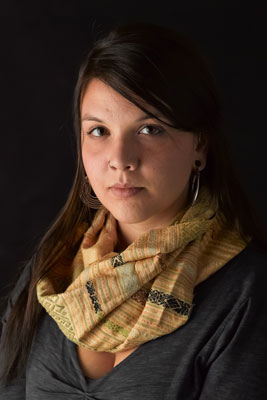
Christine Lenzen
Professor
BFA University of Minnesota, Twin Cities
MFA University of Notre Dame
WEBSITE
christinehinzlenzen.com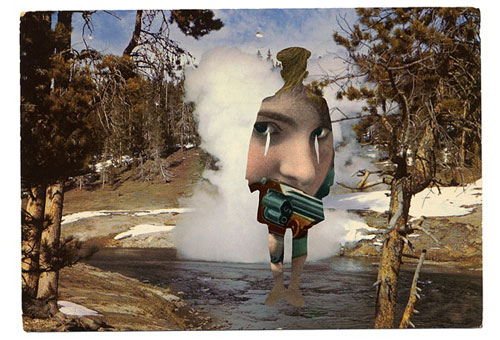
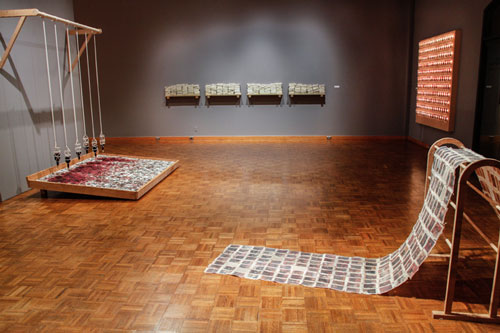
Photography Courses
click to open/closeAD 217 Photography: Foundations
4 credit hours.
Offered: Fall, Winter, Summer
Introduction to the technical and compositional aspects of digital photography. Through creative assignments, students are encouraged to explore and develop their unique strengths and interests within the medium.
AD 317A Photography: Digital Methods
4 credit hours
Offered: Fall, Winter
Prerequisite: AD 212 or AD 217 or instructor permission.
Students expand their knowledge of digital photography, focusing on advanced digital techniques and creative processes while developing their individual photographic practices.
AD 317B Photography: Analog Methods
4 credit hours
Offered: Fall
Prerequisite: AD 212 or AD 217 or instructor permission.
Introduction to analog photography processes. Through creative projects, students are encouraged to explore the various qualities of analog techniques while continuing to advance their individual photographic practices.
AD 417A Photography: Contemporary Practices
4 credit hours
Offered: Winter, odd numbered years
Prerequisite: AD 303 or concurrent enrollment, AD 317A or AD317B or instructor’s permission.
Design and implementation of individual advanced projects while exploring contemporary theoretical and critical photographic concepts.
AD 417B Photography: Professional Practices
4 credit hours
Offered: Winter, even numbered years
Prerequisite: AD 303 or concurrent enrollment, AD 317A or AD317B or instructor’s permission.
Design and implementation of individual advanced projects while gaining knowledge of professional practices within the photographic field.
Photograpy FAQ
click to open/closeWhat degree should I pursue?
The majority of photography majors pursue the Bachelor of Fine Arts degree often referred to as the BFA degree. This degree provides for more studio credit hours than does a BA or BS degree. Once you declare a major or your pursued degree you may change at any time - so don't feel as if you are locked in – you are not.
What do I need in terms of a camera?
All photography students (starting with the 100 level class) will need to have access to a digital camera with RAW capability. The photography lab has twenty Nikon D 40 Digital SLR cameras available for loan to students on a 24 hour time period. Students must provide their own secure digital card when borrowing cameras from the lab. Advanced photography majors will need to have access to a film camera of any format from 35mm SLR, medium format cameras to pinhole or plastic toy cameras. View camera work requires the use of a studio view camera (both digital and film based) which are provided by the university in the lighting studio. Some of our students do go on to purchase better cameras and lenses, however, there is no requirement for that.
Will I need to summit a portfolio for admission?
No portfolio review is required. For general requirements for admission into the University you should check with the Admissions Office.
What emphasis will I find in the photography program?
You will learn photography from actual hands-on assignments and group critiques. AD 117 (the first class in our photography program) places an emphasis on the fundamentals of photographic image making techniques and theoretical practices using digital technology. You will learn how to use your camera, compose as you photograph for specific assignments, and produce prints as you acquire skills in Adobe software applications for image editing practices. The emphasis is on creativity and communication. In the AD 217 class you will learn color photography using digital technology and some transparency film. The digital images will be downloaded directly into the computer. Transparencies will be electronically scanned to produce final photo quality prints using digital printers. In the upper level classes an emphasis is placed on traditional black-and-white and alternative processes, use of the film and digital view cameras, studio lighting, refinement of print quality and pursuing your personal and professional direction.
Do most of your majors find employment?
Since not all graduates keep in contact it would be difficult to answer that question. However, many of our graduates who keep in contact have found related employment after graduation. Our program provides instruction in the most current technological methods along with traditional processing techniques, essential to the educational experience and foundation for seeking professional employment. We also provide insight as to what future employers will expect from graduates. Our students generally stay within the Mid-West after graduation. However, we have had students work professionally from Los Angeles to New York. One important realization about professional photography is the diversity of the field. Portraiture, fashion, food, product, editorial, architectural, corporate photography and fine art practices are just a few of the possible professional directions to pursue. A growing number of our graduates are also pursuing graduate studies.
What about the new building?
The new photography facility provides a much-improved working space for the photography program. The computer art laboratory is equipped with the most up to date versions of software on the newest models of Macintosh computers and Epson printers. The traditional wet darkroom has more enlargers in the black and white print room as well as for the advanced lab; a larger film processing area, another processor room for color film and large format processing will accent the new space. Over all the new area should be much improved as far as work flow and space utilization.
May I enroll in other Art and Design classes?
Yes - there are elective Art and Design credits designed into the curriculum. You should consult with your advisor for specific details. Any 100 level Art and Design studio class has no pre-requisites.
What if I have problems enrolling in the AD 117 Introduction to Photography?
The AD 117 photography class does fill quickly. If the class is closed contact the professor (via email). Sometimes there are some drops in enrollment before the semester starts so check again.
Should I purchase supplies early?
It is always best to attend class first to find out what specific supplies are required.
Are there scholarships for incoming freshman?
The school offers the High School Freshman Scholarship (four $1000 awards) that is available each year with applications due in February.
See the web for details
Scholarship Information





















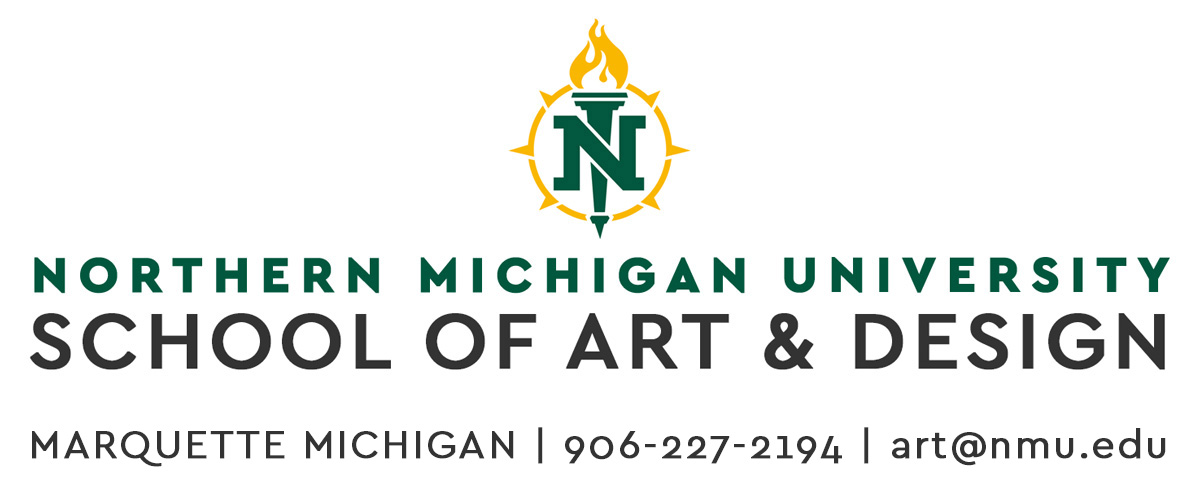
 NMU is an
NMU is an 



